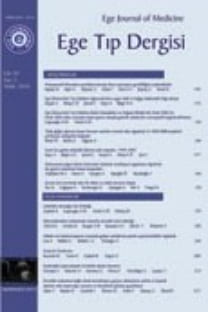İlk yıl asistanı aydınlatılmıs onam alabilir mi?
Eğitim, Etik, tıbbi, Aydınlatılmış onam, Asistan doktorlar, Öğretim, Hasta hakları, Formlar
Can first-year residents obtain informed consent?
Education, Ethics, Medical, Informed Consent, Physician Assistants, Teaching, Patient Rights, Forms,
___
- 1. Altun A. Yeni Türk Ceza Yasası sağlık alanına neler getiriyor? Trakya Üniversitesi Hastane Bülteni 2005;4:4-8
- 2. Angelos P, DaRosa DA, Bentram D, Sherman H. Residents seeking informed consent: are they adequatly knowledgeable? Curr Surg 2002;59:115-118
- 3. Coles WH, Wear ST, Bono JJ, et al. Teaching the informed consent process to residents. Southern Med J. 1989;82:64-66
- 4. Houghton DJ, Williams S, Bennett JD, et al. Informed consent: patients’ and junior doctors’ perceptions of the consent procedure. Clin Otolaryngol. 1997;22:515-518
- 5. Mulcahy D, Cunningham K, McCormack D, et al. Informed consent from whom? J R Coll Surg Edinburgh. 1997;42:161-164
- 6. Soin B, Smellie WAB, Thomson HJ. Informed consent: a case for more education of the surgical team. Ann R Coll Surg England. 1993;75:62-65
- 7. Özlü T. Aydınlatılmıs onam formları nasıl olmalı? http://www.medimagazin.com.tr/kose-yazisi_50670.html (2005)
- 8. Yeni Türk Ceza Adaleti Sistemi tanıtım sitesi. http://www.ceza-bb.adalet.gov.tr (2005)
- 9. Çelik F. Cerrahları bekleyen risk ve tehlikelere karsı cerrahın korunma yolları. Ulusal Cerrahi Kongresi 2006 konusması – Antalya 2006
- 10. Petrila J. The emerging debate over the shape of informed consent: can the doctine bear the weight? Behav Sci Law. 2003;21:121-133
- 11. Akkad A, Jackson C, Kenyon S, et al. Informed consent for elective and emergency surgery: questionnaire study. BJOG.2004;111:1133-1138
- ISSN: 1016-9113
- Yayın Aralığı: 4
- Başlangıç: 1962
- Yayıncı: Ersin HACIOĞLU
Ectopic thoracic kidney: a case report
Denizli’deki 6-7 yaş okul çocuklarında allerjik hastalıklarının prevalansları
Ahmet AKÇAY, E. DAĞDEVİREN, Z. TAMAY, M. ZENCİR, U. ONES, N. GÜLER
Deri infeksiyonu sonrası Staphylococcus aureus spondiliti: bir olgu sunumu
B.M. SUNTUR, Oğuz Reşat SİPAHİ, Ç. BÜKE, Ç. ÇALLI, T. DİLBASTI
A. SARI, M. ERMETE, F. DAĞ, A. ÇALLI, A. BÖLÜKBAŞI, C. GİRGİN
Postmenopozal kadınlarda Tibolon’un tolerebilitesi, vajinal kanama oranı ve meme semptomları
Granülomatöz karaciğer hastalıkları: üç olgu
Ş. ŞENOL, Meltem IŞIKGÖZ TAŞBAKAN, H. PULLUKÇU, B. ARDA, T. YAMAZHAN, Ç. BÜKE, S. ULUSOY
Unilateral double kidney with contralateral supernumerary kidney which found incidentally
Fatma MUTLUBAŞ, S. MİR, E. SEVİNÇ, Ö. TÜRKER
Etkin bir sunum yapmanın öyküsü
Papiller sinsityal metaplazi ve villoglandüler endometrioid adenokarsinom birlikteliği
Metin AKBULUT, C. M TEREK, O. ZEKİOĞLU, N. ÖZDEMİR
Gebelerde grup B streptokok kolonizasyonu ve antimikrobiyal direnç paterni
